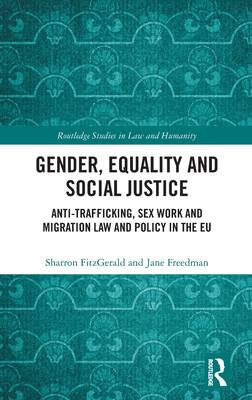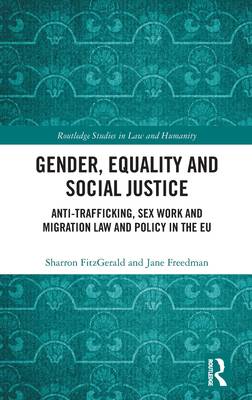
- Afhalen na 1 uur in een winkel met voorraad
- Gratis thuislevering in België vanaf € 30
- Ruim aanbod met 7 miljoen producten
- Afhalen na 1 uur in een winkel met voorraad
- Gratis thuislevering in België vanaf € 30
- Ruim aanbod met 7 miljoen producten
Zoeken
Gender, Equality and Social Justice
Anti Trafficking, Sex Work and Migration Law and Policy in the EU
Sharron Fitzgerald, Jane Freedman
€ 274,95
+ 549 punten
Omschrijving
This book addresses a gap in both contemporary theorising and empirical analysis of the European Union's (EU) law and policy frameworks on migration, sex work and anti trafficking. Drawing on the authors' previous research on these policies and with their practical experience of engaging with various EU institutions in law and policy-making fora around gender, equality and justice, the work examines the processes involved in constructing and enacting policy frameworks and legal interventions on these issues, within a feminist analytical framework. The authors map how EU agenda-setting operates, and detail the roles that various EU institutions, external groups and actors, including non-governmental organisations, play in promoting or blocking policy on these three issues. The book draws on feminist theorising on gender, policy-making and social justice to develop a general theoretical framework to help us understand how and why a consensus has seemingly been achieved at EU level on what constitutes gender equality in these three policy areas. The book presents a valuable resource for academics, researchers and policy makers in Law, Migration, EU policy making and Gender Studies.
Specificaties
Betrokkenen
- Auteur(s):
- Uitgeverij:
Inhoud
- Aantal bladzijden:
- 152
- Taal:
- Engels
- Reeks:
Eigenschappen
- Productcode (EAN):
- 9780367753993
- Verschijningsdatum:
- 19/09/2022
- Uitvoering:
- Hardcover
- Formaat:
- Genaaid
- Afmetingen:
- 156 mm x 234 mm
- Gewicht:
- 403 g

Alleen bij Standaard Boekhandel
+ 549 punten op je klantenkaart van Standaard Boekhandel
Beoordelingen
We publiceren alleen reviews die voldoen aan de voorwaarden voor reviews. Bekijk onze voorwaarden voor reviews.











